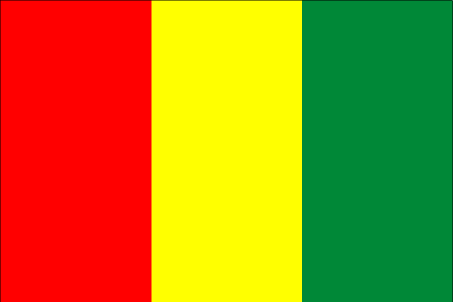Login form
Customs of Guinea
 Marriage and Family
Marriage and Family
The choice of a marriage partner may be influenced by the family. Women usually marry before they are 20, and men usually from 25 on. Traditionally, the man presents ten kola nuts to the woman’s family to propose marriage. The head of the woman’s family cracks the nuts to signal his approval. The groom offers fabric, jewelry, or cattle to the bride and her family. Muslim men are allowed up to four wives, provided they can support them.
In rural areas the extended family tends to live together, sharing child care, domestic chores, and meals. In urban areas, the number of nuclear families living in individual homes is increasing. Family obligations are taken seriously and can involve giving money, lodging, or other favors to distant relatives. In general, the eldest male presides over the household.
Extended families share a common compound with separate homes or rooms for different family groups or members. In rural areas, sturdy homes made of thick mud and thatched roofs are common. Urban homes may be single or multifamily cement-block structures.
Eating
The main meal usually consists of rice with a sauce made from palm oil and tomato paste, groundnut butter, or ground leaves. Meat or fish and vegetables, such as cassava, sweet potatoes, or squash, may be cooked with the sauce. Millet is a popular grain in the Sahelian region near
In some families, people eat separately according to age and gender. Before and after meals, a bowl of water is made available for washing hands. Most Guineans eat with the right hand from a communal dish that is often placed on the floor or a mat. It is polite for each person to eat only from the part of the dish that is immediately in front of him or her. The oldest person or the woman who prepared the meal may divide the meat and vegetables among those eating. Most Guineans do not drink during a meal because to do so may imply that something is wrong with the food. Most drink water after the meal. Guests always thank the host at the end of the meal. The host often replies with Albarka, an Arabic term used to credit Allah with providing the food.
Many Guineans living in nonagricultural areas eat the main meal at midday and another meal or leftovers in the evening. Breakfast may include coffee and bread, as well as any leftovers from the previous day. In agricultural areas, people working in the fields eat a larger breakfast, which may include hot cereal. They eat their main meal upon returning from the fields in the evening.
Socializing
Guineans take it as a personal slight when someone fails to greet them properly, and it is usual to greet tradespeople such as store clerks and taxi drivers, as well as friends and acquaintances. French, Arabic, or the language of the particular region or of the individual to whom they are speaking is used in greetings. Greetings are usually followed by inquiries about the other person’s family. Bonjour (“Good day”) and Bonsoir (“Good evening”) are the common French greetings.
The right hand is used to shake hands. Raising both hands, palms out, is used to greet a larger group or someone too distant for a handshake. Some older men greet women this way instead of shaking hands. If seated, a person shows respect by standing to shake hands. Respect is also demonstrated by grasping one’s own right forearm with the left hand while shaking hands. A left handshake might be used when good friends are parting for a long time.
When addressing others, Guineans use titles such as Madame or Monsieur instead of first names. Familial titles such as frère (“brother”), tanti (“aunt”), and cousin are also used—with strangers as well as within the family. Men and women do not show affection in public, but friends of the same sex often hold hands or walk arm in arm.
Guineans consider a visit an honor. They frequently invite friends over for a meal, but an invitation is not necessary for a visit. People sometimes visit simply to exchange greetings. To pass by a friend’s home without stopping briefly is considered an insult. Proper greetings are exchanged at every visit, regardless of the purpose. A visitor does not usually bring a gift, but asks for the hosts to return the visit. The exception is when someone returns or arrives from out of town; then an appropriate gift is fabric or food, such as fruit, vegetables, or rice, or a specialty of the region from which the person has come.
Recreation
Soccer is the most popular sport in
Holidays and Celebrations
Guinean holidays include New Year’s Day (1 January), Easter, Tabaski (a Muslim holiday commemorating Abraham’s willingness to sacrifice his son to Allah), a feast at the end of Ramadan, Labor Day (1 May), Mawloud (the prophet Muhammad’s birthday), Independence Day (2 October), All Saints’ Day (1 November), and Christmas Day (25 December). Muslim holidays involve people attending a mosque, visiting friends and family, and eating large meals.
Dancing is popular at weddings and other celebrations. Family celebrations are held for baptisms and weddings in both Muslim and Christian traditions. It is customary at these events for griots (traditional singers) to sing about individual guests, and the honored person is expected to give the griots a small sum of money in return.
Source: Encarta Interactive World Atlas

